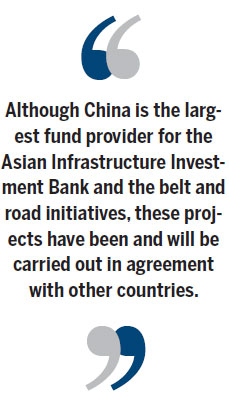Projects promote fairness as supreme value
Updated: 2015-05-01 08:05
By Zhao Lei(China Daily Europe)
|
|||||||||||
China-led initiatives must be efficient, transparent to achieve objectives
China should stop other countries from politicizing the Asian Infrastructure Investment Bank and the belt and road initiatives by making the projects' strategic objectives clear to the world and ensuring they function transparently and efficiently. This is vital because through these go-global initiatives, China can help make international rules fairer.
Handling international relations responsibly does not mean only helping a country with funds, it also means providing more public products to meet people's needs and cultivating developing countries' agenda-setting abilities in international politics. Through the new bank and belt and road initiative frameworks, China needs to guide the international community's discussions and limited resources in a direction that would boost developing country's growth and restructuring, and benefit their people.
The Association of Southeast Asian Nations summit in 2010 issued an overall regional inter-connectivity plan, estimating that the more than 700 projects would need $380 billion in investments. The problem is that, when it comes to providing funds, some countries and international organizations always find excuses not to do so.

The existing regional and global financial institutions such as the Asian Development Bank, the World Bank and the International Monetary Fund are dominated by the United States and its Western allies and impose harsh requirements on the countries seeking funds. Some of their conditions are ideologically prejudiced, and sometimes they even interfere with the internal affairs and sovereignty of applicant countries.
Although China is the largest fund provider for the Asian Infrastructure Investment Bank and the belt and road initiatives, these projects have been and will be carried out in agreement with other countries. Moreover, China does not seek veto power in the projects, and it will certainly not follow the examples set by the Asian Development Bank, World Bank and the IMF.
Many Western critics compare the belt and road initiatives and the Asian Infrastructure Investment Bank to the Marshall Plan and the Bretton Woods system dominated by the US after World War II. But being aimed at fostering common development, the China-led projects are fundamentally different from the latter two, which helped consolidate and defend US hegemony.
If the China-led projects are well implemented, they will also provide the developed economies with more accessible markets, expand aggregate global demand and power the world economy's total recovery.

Many of the infrastructure projects in developing countries need large sums of money, and lots of coordination and time to complete, which cannot be provided by one single country or organization. Only multilateral cooperation can guarantee that. And given its rising global influence, comparative advantage in infrastructure construction and huge production capacity, China can be a responsible coordinator as well as an active participant in these win-win projects.
In particular, the two China-led projects should promote eco-friendly and sustainable development in developing countries, and make the loan and assistance mechanism more worthwhile.
Of late, the US' attitude toward the Asian Infrastructure Investment Bank has changed from being critical to supportive, which can be attributed to the domestic pressure Washington is facing to accept the fact that the rise of emerging economies is reshaping the world order and the global economy. Perhaps the US has realized that it can maintain its influence in Asia only by working with China.
The US urges China to shoulder more global responsibilities but, at the same, it tries to thwart many of China's efforts in this regard if it feels China is challenging its position.
Chinese leaders' diplomacy adheres to the concept of a community of shared interests and one that shares the common fate. The Asian Infrastructure Investment Bank and the belt and road initiatives are new manifestations of that community. Since the two China-led projects are opposed to hegemony and privileges, they should help establish fairness as the supreme value in Asia and beyond.
The author is a researcher in international strategies at the Party School of the Central Committee of the Communist Party of China, in Beijing. The views do not necessarily reflect those of China Daily.
(China Daily European Weekly 05/01/2015 page12)
Today's Top News
Protest against police violence expands to NYC
Milan tightens security ahead of Expo opening
Chinese scientists discover 'batman dinosaur'
China trainmakers seek control of Bombardier's rail unit
US Senate rejects bid to toughen Iran nuclear review bill
New Zealand voices dismay at executions in Indonesia
China hits out as Abe visits the US
No hiding place overseas for fugitive officials
Hot Topics
Lunar probe , China growth forecasts, Emission rules get tougher, China seen through 'colored lens', International board,
Editor's Picks

|

|

|

|

|

|






